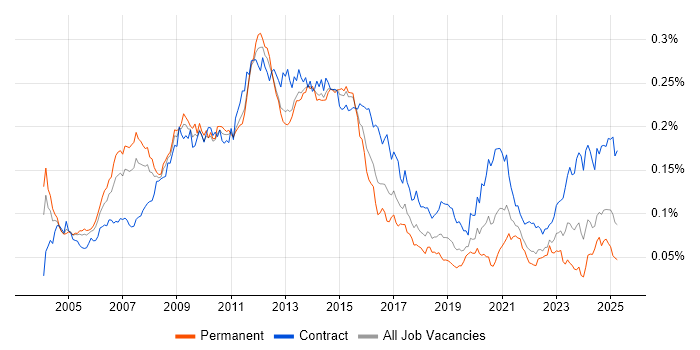Oracle Architect
UK
The median Oracle Architect salary in the UK is £85,000 per year, according to job vacancies posted during the 6 months leading to 4 May 2025.
The table below provides salary benchmarking and summary statistics, comparing them to the same period in the previous two years.
| 6 months to 4 May 2025 |
Same period 2024 | Same period 2023 | |
|---|---|---|---|
| Rank | 678 | 883 | 940 |
| Rank change year-on-year | +205 | +57 | +231 |
| Permanent jobs requiring an Oracle Architect | 22 | 21 | 54 |
| As % of all permanent jobs advertised in the UK | 0.042% | 0.021% | 0.052% |
| As % of the Job Titles category | 0.046% | 0.023% | 0.057% |
| Number of salaries quoted | 15 | 7 | 39 |
| 10th Percentile | £77,500 | £71,250 | £75,000 |
| 25th Percentile | £78,750 | £76,250 | £83,750 |
| Median annual salary (50th Percentile) | £85,000 | £85,000 | £100,000 |
| Median % change year-on-year | - | -15.00% | +11.11% |
| 75th Percentile | £90,000 | £95,000 | - |
| 90th Percentile | £112,000 | £97,000 | £103,000 |
| UK excluding London median annual salary | £90,000 | £90,000 | £78,750 |
| % change year-on-year | - | +14.29% | -7.35% |
All Permanent IT Job Vacancies
UK
For comparison with the information above, the following table provides summary statistics for all permanent IT job vacancies. Most job vacancies include a discernible job title that can be normalized. As such, the figures in the second row provide an indication of the number of permanent jobs in our overall sample.
| Permanent vacancies in the UK with a recognized job title | 47,541 | 93,322 | 94,998 |
| % of permanent jobs with a recognized job title | 90.35% | 94.63% | 91.54% |
| Number of salaries quoted | 27,467 | 66,921 | 59,760 |
| 10th Percentile | £30,000 | £28,500 | £32,500 |
| 25th Percentile | £42,000 | £38,500 | £45,000 |
| Median annual salary (50th Percentile) | £57,500 | £52,550 | £60,000 |
| Median % change year-on-year | +9.42% | -12.42% | - |
| 75th Percentile | £75,000 | £71,250 | £81,250 |
| 90th Percentile | £97,500 | £90,000 | £100,000 |
| UK excluding London median annual salary | £52,000 | £50,000 | £53,000 |
| % change year-on-year | +4.00% | -5.66% | +6.00% |
Oracle Architect
Job Vacancy Trend
Job postings that featured Oracle Architect in the job title as a proportion of all IT jobs advertised.

Oracle Architect
Salary Trend
3-month moving average salary quoted in jobs citing Oracle Architect.
Oracle Architect
Salary Histogram
Salary distribution for jobs citing Oracle Architect over the 6 months to 4 May 2025.
Oracle Architect
Top 13 Job Locations
The table below looks at the demand and provides a guide to the median salaries quoted in IT jobs citing Oracle Architect within the UK over the 6 months to 4 May 2025. The 'Rank Change' column provides an indication of the change in demand within each location based on the same 6 month period last year.
| Location | Rank Change on Same Period Last Year |
Matching Permanent IT Job Ads |
Median Salary Past 6 Months |
Median Salary % Change on Same Period Last Year |
Live Jobs |
|---|---|---|---|---|---|
| England | +184 | 22 | £85,000 | - | 23 |
| UK excluding London | +205 | 13 | £90,000 | - | 15 |
| Work from Home | +169 | 10 | £80,000 | -3.03% | 17 |
| London | +100 | 9 | £85,000 | +7.94% | 11 |
| North of England | +72 | 4 | £90,000 | +4.35% | 1 |
| South East | +109 | 3 | £120,000 | - | 2 |
| Midlands | - | 3 | £80,000 | - | 3 |
| West Midlands | - | 3 | £80,000 | - | 3 |
| North West | +22 | 2 | £80,000 | -7.25% | |
| Yorkshire | - | 2 | £90,000 | - | 1 |
| South West | - | 2 | £100,000 | - | 7 |
| Northern Ireland | - | 2 | - | - | |
| East of England | +52 | 1 | £87,500 | -12.50% |
Oracle Architect Skill Set
Top 30 Co-occurring Skills and Capabilities
For the 6 months to 4 May 2025, Oracle Architect job roles required the following skills and capabilities in order of popularity. The figures indicate the absolute number co-occurrences and as a proportion of all permanent job ads featuring Oracle Architect in the job title.
|
|
Oracle Architect Skill Set
Co-occurring Skills and Capabilities by Category
The follow tables expand on the table above by listing co-occurrences grouped by category. The same employment type, locality and period is covered with up to 20 co-occurrences shown in each of the following categories:
